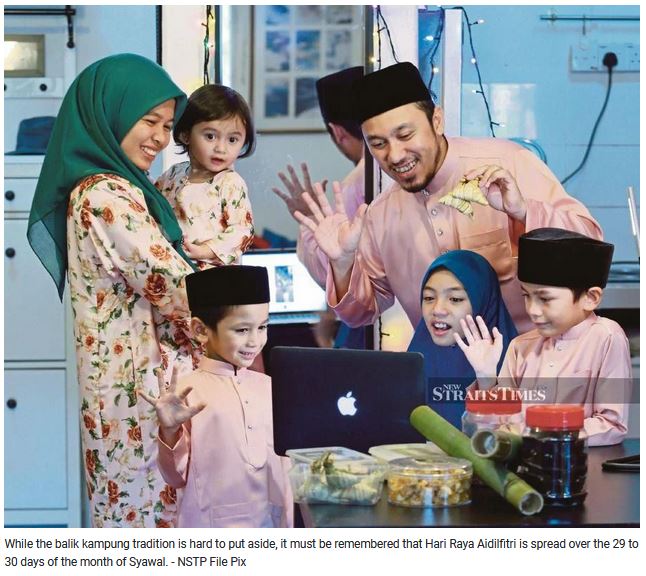Tap into Ramadan's sacrificial spirit for a blessed, healthy Syawal
Emeritus Professor Tan Sri Dato' Dzulkifli Abdul Razak
Opinion - New Straits Times
May 11, 2021
Hari Raya Aidilfitri is just around the corner. Like all festivities before this during the Covid-19 pandemic, questions about celebrating it are raised. It is not an easy decision that often produces controversies.
The controversy now is even more tenacious due to the heightened number of new daily Covid-19 infections. Some say it will soon breach the five-figure range. Others point to the deadly Indian experience if we get it wrong. Either way, we are in a dilemma, but we must not gamble.
While the balik kampung tradition is hard to put aside, it must be remembered that Hari Raya is spread over the 29 to 30 days of the month of Syawal. In other words, we need not all rush to balik kampung like during the pre-Covid-19 days. If there is a wisdom we can learn during Ramadan it is that we should weigh what is best for not only the individual but more so the community as a whole — locally, nationally and indeed internationally.
Apart from being empathetic and compassionate, being patient and resolute are two other attributes that should grow in a person during Ramadan. These produce a vital force to arrive at the most humane decision without upsetting the whole.
It is only natural to expect that vital force to come into play in preserving the notion of Hari Raya festivities by not conceding to the pandemic in any callous way. This meets the aim of Ramadan that transcends any given need and want.
At the same time, Syawal is a month that recognises the effort of fasting to reinstate the best of humanity — restoring justice, equity, fairness and reaffirming noble values on the sanctity of life.
That said, the dilemma involving vaccines has not gotten any easier. For example, the AstraZeneca (AZ) Covid-19 vaccine continues to be linked to rare blood clots in the brain. More cases have been reported and voices of scepticism are causing undue distraction.
On top of this, significant changes are being made according to British government regulators, namely those under 40 years old who are being offered "an alternative to AZ jabs amid concern over rare blood clots".
The Joint Committee on Vaccination and Immunisation (JCVI) had reviewed the AZ vaccine after the first shots were administered and reportedly said government advisers wanted citizens to take Pfizer-BioNTech or Moderna due to an "abundance of caution". This is new to Malaysia since the AZ vaccine was first offered on the basis of first come, first served. So, where are we now?
The JCVI is said to keep their recommendations under review in line with the latest scientific advice, although Britain's Health Department had earlier said that "medicines regulator MHRA continues to recognise that the benefits of the Oxford/AZ vaccine outweigh the risks for the
vast majority of adults".
The committee had advised pregnant women to get the Pfizer or Moderna vaccines despite a "vanishingly" rare side effect of blood clots.
"We are advising a preference for one vaccine over another for a particular age group, really out of the utmost caution, rather than because we have any serious safety concern," to quote the chair of Britain's JCVI.
The updated guidance and decision was made after finding out those aged 30 to 39 were at an increased risk of suffering a severe but rare blood clot after receiving the AZ jab.
Moreover, the blood clots produced a fatality rate of 20 per cent, and supplemental reviews found the risk of blood clots was higher in women.
The European Medicines Agency earlier cautioned that there was a "remote possibility" of rare blood clots occurring, asserting that "a causal link with the vaccine is not proven but is possible and further analysis is continuing" while repeating that the vaccine's benefits outweigh the risks.
Nevertheless, given the new development, Malaysians must be kept informed for a better decision. Let's tap into the sacrificial spirit of Ramadan in delivering a Syawal that is free of Covid-19 as far as possible.
The writer, an NST columnist for more than 20 years, is International Islamic University Malaysia rector

